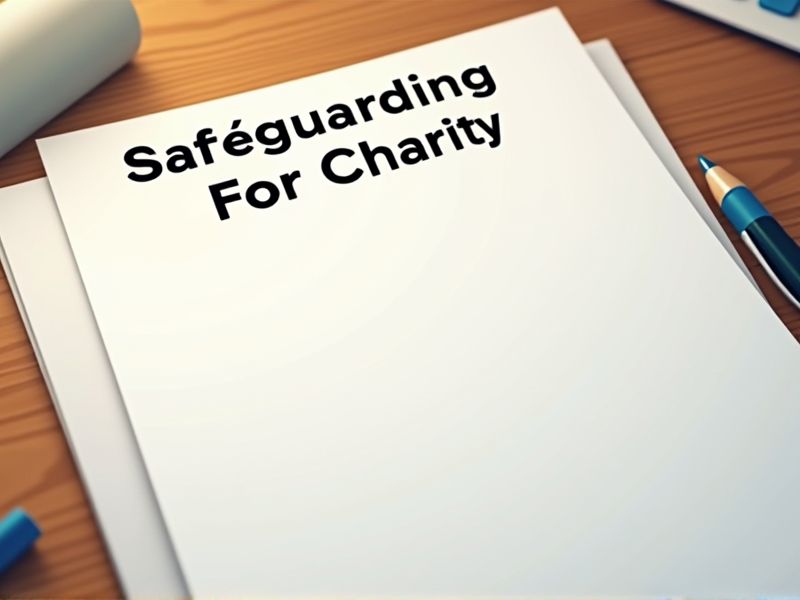
Safeguarding Officers for charities play a crucial role in ensuring vulnerable populations are protected, necessitating a comprehensive understanding of safeguarding policies and legal regulations. Relevant certifications provide the necessary training to recognize and respond effectively to signs of abuse and neglect. These qualifications are essential to validate an officer's expertise and commitment to maintaining safety standards within charitable organizations. Important certifications needed for a Safeguarding Officer in a charity include specific safeguarding, child protection, and organizational policies courses.
Child Safeguarding and Protection Certification
Child Safeguarding and Protection Certification provides the essential knowledge for safeguarding officers to identify and respond to signs of child abuse or neglect effectively, thereby ensuring the safety of children engaged with the charity's services. This certification educates officers on current legal and ethical standards, which helps prevent potential legal liabilities for the organization. Without proper certification, safeguarding officers may lack the required skills to handle sensitive situations, increasing risk for both the charity and the children involved. Having certified professionals enhances the charity's reputation and trustworthiness, which can strengthen community relations and support.
Adult Safeguarding and Protection Certification
Adult Safeguarding and Protection Certification equips safeguarding officers with the necessary knowledge to recognize signs of abuse and neglect, which is crucial for addressing potential risks effectively. Charitable organizations often work with vulnerable adults, making informed protection measures essential to maintain their well-being. Certification ensures that officers are trained to comply with legal obligations and uphold ethical standards while safeguarding activities. It provides the skills and confidence officers need to implement and monitor robust safeguarding policies within the organization.
Vulnerable Adults Safeguarding Certification
Vulnerable Adults Safeguarding Certification ensures that safeguarding officers in charities possess the essential skills and knowledge to protect at-risk adults from abuse or neglect. Without this certification, officers may lack the standardized procedures necessary for identifying and addressing potential threats, leading to increased harm to vulnerable individuals. The certification also instills trust and confidence among stakeholders, including beneficiaries and donors, reinforcing the charity's commitment to safety. In cases where safeguarding officers are untrained, the charity faces potential legal liabilities and reputational damage.
Safeguarding Leadership in Charities Certification
Safeguarding Leadership in Charities Certification equips safeguarding officers with specialized knowledge, thereby enhancing their ability to protect vulnerable groups within organizations. Increased competency from certification results in improved trust from donors and the community, crucial for a charity's reputation. Certified officers often develop robust policies and procedures, reducing the risk of harm or legal liability. Consistent standards and practices established through certification elevate overall efficiency and effectiveness in safeguarding efforts.
Risk Management in Safeguarding Certification
The implementation of risk management in safeguarding certification equips safeguarding officers with the necessary skills to identify potential threats within charitable organizations, ensuring the protection of vulnerable individuals. By understanding and addressing these risks, officers can develop and implement effective policies and procedures, reducing the likelihood of harm or abuse. Certification provides assurances to stakeholders and the community that the charity is committed to maintaining high safeguarding standards. Comprehensive risk management training enhances the overall trust and reputation of the charity, facilitating better support and engagement from donors and volunteers.
Trauma-Informed Care Certification
Trauma-Informed Care Certification equips safeguarding officers with the necessary skills to recognize and appropriately respond to the effects of trauma, enhancing their ability to support vulnerable individuals in charity settings. Understanding trauma helps these officers create safer environments where individuals feel understood and respected, reducing the likelihood of retraumatization. This certification provides officers with strategies to approach situations with empathy and sensitivity, improving trust and communication between them and those they support. The training also ensures that safeguarding officers can implement policies that reflect a comprehensive understanding of trauma, leading to more effective interventions and support mechanisms.
Equality, Diversity, and Inclusion in Safeguarding Certification
Safeguarding Officers require Equality, Diversity, and Inclusion certification to ensure they address the varied needs of individuals within a charity's care. This certification equips officers with skills to recognize and mitigate implicit biases, fostering a more inclusive environment. Diverse perspectives help in identifying potential safeguarding risks that might otherwise be overlooked. Understanding these principles supports compliance with legal and ethical standards in protecting vulnerable populations.
Data Protection and Confidentiality Certification
Data Protection and Confidentiality Certification enhances a safeguarding officer's ability to manage personal data responsibly, ensuring compliance with legal requirements. This certification mitigates risks associated with data breaches, preserving the charity's reputation and trust. Understanding data protection principles helps in effectively identifying potential vulnerabilities in information handling processes. Training in confidentiality ensures that sensitive information is managed with integrity, fostering a secure environment for beneficiaries and staff.
Mental Health First Aid Certification
Understanding mental health crises equips safeguarding officers with the skills to identify signs of distress, ensuring timely intervention. The certification provides practical tools that enhance the ability to de-escalate potentially harmful situations, fostering a safer environment. Charity organizations often encounter vulnerable individuals, making it crucial for officers to effectively address mental health needs. Having certified staff also improves trust with beneficiaries, reinforcing the organization's commitment to comprehensive care.
Crisis Intervention and Management Certification
Crisis Intervention and Management Certification equips a Safeguarding Officer with the skills necessary to effectively handle emergency situations, reducing harm and ensuring safety in a charity setting. With evidence showing increased vulnerability in communities served by charities, certified officers can identify and mitigate risks more efficiently. The certification offers a framework for standard practices, which improves coordination among team members and other agencies. Public trust and donor confidence in the charity rise when they see qualified personnel managing crises responsibly.
Summary
By obtaining certifications, you enhance the credibility of the charity, fostering trust among stakeholders. Increased confidence among donors often results in higher donations and support. Certified safeguarding officers typically implement more effective protection policies, reducing risks and liabilities. Consequently, this often leads to a safer environment for beneficiaries and volunteers.
